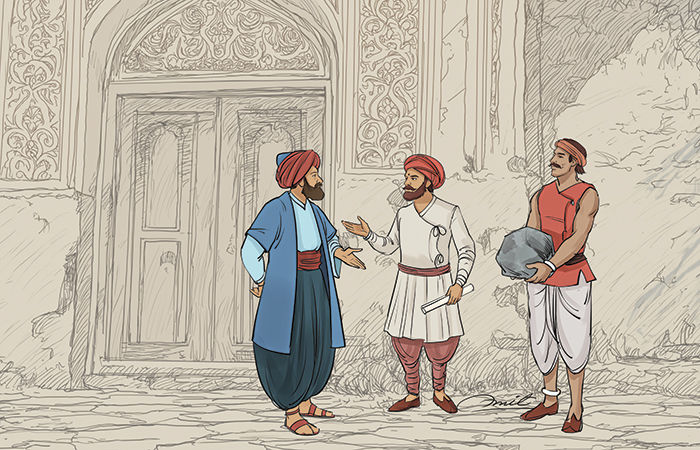One Stone Worth Millions, Another Worth Nothing

- A Story From Iran's Port City of Bushire
- ‘If the stone is truly worthless, then both of you should let it go. But if you want to take it, then pay a price for it...’
Jivram Joshi
T here was once a busy port in Iran called Bushire. Merchants from many lands had their large trading houses there. Goods from many countries were bought and sold at this port.
One day, a ship from Gujarat docked at the port. It was loaded with goods worth millions of rupees. Traders from Turkistan, Syria, Afghanistan, Tashkent, and other countries came and purchased the goods from Gujarat.
The Gujaratis received bags full of gold coins worth two lakh rupees in return. Then they bought goods from those countries, loaded them onto the ship, and prepared to sail back home at an auspicious hour.
This ship belonged to Jagadusha Sheth, a man so wealthy and respected that he was called the "King of Gujarat." Merchants from Arabia and Iran knew him only by name.
The captain of this ship was a young man named Jaysinh. He was clever, intelligent, and also very brave. Jagadusha liked such young men. That's why he entrusted a whole ship to Jaysinh and even gave him the freedom to buy and sell goods worth up to five lakh rupees.
On the last day before the ship was to leave, Jaysinh, along with four or five of his companions, decided to take one last stroll through the city. They wandered through the lanes and bazaars until suddenly Jaysinh's eyes fell on a large stone lying on the ground.
It was a heavy stone, maybe weighing ten kilos. Jaysinh stopped and stared at it. He told one of his companions,
"Pick up this stone."
The companion lifted it.
Just then, a wealthy merchant from the city of Shiraz was walking behind them. He saw this and immediately recognized Jaysinh as the famous Gujarati merchant. The Shiraz merchant was surprised. Why would such a rich and respected man pick up a useless stone lying on the road?
Curious, the merchant rushed forward, called out loudly, and stopped Jaysinh. Then he asked,
"Brother! Why have you picked up this stone?"
Jaysinh calmly replied,
"Oh, nothing much."
The merchant pressed further,
"But why would anyone lift a stone lying on the road?"
Jaysinh said,
"Well, I just thought… why not take a stone from Iran back to our country? That's all."
The merchant grew suspicious. He thought, Surely, this must be a precious stone. That's why he has picked it up.
Being a cunning man, the merchant said,
"Sir, I also know the true value of this stone. I have already paid its owner the price. I was just on my way to take it when I saw you. But never mind, please put it down now."
Jaysinh immediately understood. The merchant had gotten the wrong idea-that the stone must be valuable.
He explained,
"Merchant Saheb, believe me, this stone is nothing. For some reason, I just felt like taking it home to our country."
But the merchant was not convinced.
He insisted, "If that's the case, then leave this stone and take some other stone instead."
Jaysinh refused,
"No. Why should I? Just because you doubt me, I don't have to prove anything."
Soon, the argument grew into a quarrel.
Jaysinh said firmly, "I will not leave this stone."
The merchant shouted, "And I will not allow you to take it!"
The matter escalated. Finally, the merchant went and complained to the city's Qazi (judge).
The Qazi listened and said,
"If the stone is truly worthless, then both of you should let it go. But if you want to take it, then pay a price for it. Whoever offers more money will get the stone."
The merchant quickly said,
"I'll pay five gold coins."
Jaysinh responded,
"I'll pay one hundred gold coins."
The merchant now became even more suspicious. *This stone must definitely be priceless,* he thought. So he raised his offer:
"I'll pay two hundred."
Jaysinh calmly countered:
"One thousand."
Back and forth they went-five hundred, a thousand, fifty thousand, one lakh…
Finally, the merchant shouted,
"One and a half lakh gold coins!"
Jaysinh boldly declared,
"I'll give two lakh!"
The merchant froze. He couldn't go beyond that amount. Jaysinh too had exactly two lakh gold coins. Since the merchant backed down, Jaysinh immediately had his men bring the money, counted it out, and paid it. He then carried the stone and placed it safely on his ship.
When the ship reached Gujarat, Jaysinh went to meet Jagadusha Sheth. But he looked troubled and downcast.
Jagadusha asked,
"Why do you look so worried, Jaysinh? Did we suffer a loss?"
Jaysinh told him everything: how he had spent the entire profit of two lakh gold coins on a single stone.
"All the earnings went into that stone," he sighed.
But Jagadusha smiled and said,
"At least you saved my honor! If that merchant had taken the stone away, it would have been my disgrace. You've kept Jagadusha's name intact."
Jagadusha placed the stone in his chamber.
One day, a saintly monk came to visit. He saw the stone, heard the story, and then said,
"Break open this stone."
The stone was broken. Inside, a hollow was revealed-and it was filled with real pearls and diamonds!
The monk smiled and said,
"Jagadusha, remember this: if your heart is suddenly drawn toward something for no reason, take it as a sign. It means there is hidden benefit in it for you."
Moral
Sometimes, our instincts guide us to hidden treasures. Trusting that inner pull can lead to great rewards.

